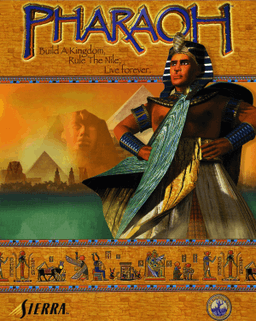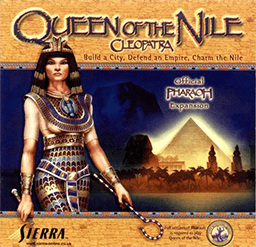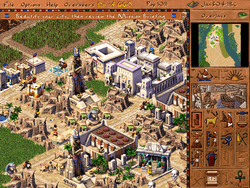Pharaoh (video game)
| Pharaoh | |
|---|---|
 | |
| Developer(s) | Impressions Games |
| Publisher(s) | Sierra Entertainment |
| Designer(s) | Chris Beatrice |
| Composer(s) | Keith Zizza, Henry Beckett |
| Series | City Building Series |
| Platform(s) | Microsoft Windows |
| Release date(s) | 1999 |
| Genre(s) | Strategy/Simulation |
| Mode(s) | Single-player |
| Distribution | CD-ROM |
| Cleopatra: Queen of the Nile | |
|---|---|
 | |
| Developer(s) | BreakAway Games |
| Publisher(s) | Sierra Entertainment |
| Designer(s) | Chris Beatrice |
| Series | City Building Series |
| Engine | Isometric projection |
| Platform(s) | Windows |
| Release date(s) | 2000 |
| Genre(s) | City-building game |
| Mode(s) | Single-player |
| Distribution | CD-ROM |
Pharaoh is an isometric city-building game set in Ancient Egypt created by Impressions Games and published by Sierra Entertainment for Microsoft Windows. It involves the construction and management of settlements and cities in ancient Egypt, and is the first such themed game in the City Building series.
The game was released on October 31, 1999. It was later complemented with an expansion pack called Cleopatra: Queen of the Nile, developed by BreakAway Games the following year, which extended the game's narrative into the Hellenistic period. Both the original game and expansion pack are commonly referred to, and may be purchased as one, under the title Pharaoh and Cleopatra.[1]
Game Description
- See this section of the City Building Series article for a gameplay overview.
Pharaoh is based on the same game engine as Caesar III, also by Sierra Entertainment, and operates on the same principles. There have been many changes, most notably the introduction of monument construction and flood-plain farming. The game has little AI, relying instead on a high level of micromanagement from the player.
In campaign mode the player begins as a local leader building a basic nomadic settlement, earning promotion by building progressively grander cities until attaining the rank of Pharaoh. There are 38 missions in total. At times the player may choose between two different missions, one being more focused on monument building and the other on military exploits. Each mission presents a number of goals that need to be met in order to progress to the next.
In addition to the campaign there are a dozen standalone scenarios, some without win conditions allowing open-ended "sandbox" city-building. A map editor facilitating user-designed scenarios completes the suite.
Gameplay
Pharaoh is a game where the player is responsible for setting up a city to prosper by building both industry and housing units, providing resources, pleasing the gods, trading with other cities and engaging in battle with rivals who try and invade the city.
Food production in Pharaoh is done either by farming, hunting or fishing. The farming is based on the annual inundation of the River Nile whilst the other methods can be done all year round. Food can also be an important commodity used in trading and can be requested by other cities or Pharaoh himself. All houses need access to water, which is provided by water carriers working from fountains or from basic wells, both set up in areas with sufficient ground water.
Religion and worship to the gods is an important aspect of the game. In each city mission, there will be a selection of usually three gods to worship. If the gods are appeased through the building of temples and regular festivals then they will bestow gifts and blessings upon the city, however if they are displeased they can disrupt the running of the city. Each gift or disaster that a god gives will be related to whatever area they have control over.
Pharaoh has a range of different resources that can be for the citizens own personal use, to trade with or to use in the construction of monuments. The resources available are food (from farms, cattle ranches, fishing wharfs or hunting lodges), pottery (made from clay extracted from clay pits), beer (made from barley from farms), linen (made from flax from farms), papyrus (made from reeds), luxury goods (made from gemstones from gem mines), weapons (made from copper from copper mines), wood (from wood cutters) and bricks (made from clay and straw from clay pits and grain farms). Quarries can provide a supply of plain stone, sandstone, limestone and granite. Gold can be extracted from gold mines and is taken to the city palace for the treasury. The goods will either be used by the appropriate industry such as potters or breweries or taken to storage yards for use when required or to be traded with other cities. In each mission only a select amount of resources will be available and the player will need to import goods they cannot make themselves from other cities. Trading in finished products like weapons and pottery can make a city more money than exporting the raw materials, likewise importing raw materials from others and building the finished product in the city will cost less. Additionally it is more costly to trade with far off cities but a greater profit can be made by exporting goods to them. Trade between cities takes places either by land via caravans or sea via docks. In order to trade with another city, a fee must be paid to open the route. A city can have numerous trade routes operating and can import or export goods depending on what each city buys or sells. As a mission progresses, new trade routes to previously shut off cities may open depending on how quickly the players city has complied with requests from other leaders.
In order for a city to meet its targets for culture, the citizens will need to be provided with forms of entertainment. In Pharaoh, the entertainment available is performers such as jugglers, dancers and musicians and also senet houses which are venues where people will gather and drink beer. In the expansion pack, 'Cleopatra: Queen of the Nile', a zoo is available as an entertainment structure. Healthcare in cities needs to be widespread enough to cover all citizens with a range of facilities available such as physicians, dentists, apothecaries and mortuaries. Pharaoh requires areas to be desirable before housing will develop fully, factors that add to desirability of an area include gardens, statues, plazas and how far away the housing is from industrial areas.
Some cities in Pharaoh are susceptible to attack by other civilizations, and the player must counter this threat by building defenses. A maximum of six forts can be recruited from the general population, each consisting solely of infantry, archers, or chariot-riders. Walls, gates, and towers can also be built to defend the city. A Recruiter is necessary to send soldiers to a fort and, in most missions, soldiers may also visit an Academy to increase their skill level prior to be being sent on "active duty". In addition to ground forces, a Navy may also be established. Naval wharfs are built to house one naval vessel a piece. The two types of vessels available are Transports and Warships, of which the player may build several of each. In certain missions the player will be required to send military support to other cities.

Certain missions require that specific monuments be constructed before the player may move onto the next city in the campaign. Monuments are built through a lengthy process of acquiring the needed resources and recruiting labour via work camps and guilds to construct them. A city will need a supply of whatever raw material the monument is to be constructed out of (bricks, sandstone, plain stone, limestone etc.) as well as wood and whatever burial provisions have been outlined.
Campaign
The campaign begins in 3500BC during the pre-dynastic period with the player having the rank of village elder. The missions during this period are tutorial in nature, having on screen prompts and instructions on how to achieve the mission goals. The player will learn the basics on how to set up housing units, provide citizens with water, food and religious facilities. This first period ends in 3000BC and then progresses to the Archaic period. The Archaic period in the game focuses on exposing the player to the main concepts of Pharaoh. Trade routes are established, a military and navy is required, and the first monument, a mastaba tomb, will be built. During the Archaic period, the player moves from being a village noble to a royal scholar and will rule until the start of the Old Kingdom in 2650BC. Missions during the Old Kingdom are primarily concerned with monument building. It is this period that will require the construction of both step and bent pyramids, as well as pyramid complexes, the Sphinx, obelisks, and sun temples. The player will begin this era in 2650BC as a royal scribe and, throughout the missions, will move up the ranks to become a Chancellor until this period ends in 2216BC. The Middle kingdom lasts from 2216BC until 1541BC and during this time period the player will start as a vizier and end up as the Pharaoh. The main aspects of this era are dealing with the aftermath of a civil war, rebuilding cities, dealing with famine, and expanding the empire. The game concludes with the New Kingdom, a time period of 1541BC to 1279BC. The player will face threats from outside empires including the Hyksos and be responsible for building cities in the expanded empire like Byblos.
In the campaign, the player sometimes faces a choice of two different missions, one of these is a peaceful monument-construction oriented one, the other is focused on military. The completion of only one is required to progress. In this listing the first one is the peaceful and the second is the military mission (when presented with a choice). The Greek names of the cities are in brackets.
Campaign: Predynastic Period
- Nubt (Naqada)
- Thinis
- Perwadjyt (Buto)
Campaign: Archaic Period
Campaign: Old Kingdom
- Abu (Elephantine) or Selima Oasis
- Saqqara
- Meidum or Serabit Khadim
- South Dahshur or Buhen
- North Dahshur
- On (Heliopolis) or Iunet (Dendera)
- Rostja (Giza)
- Djedu (Abusir) or Bahariya Oasis
- Dakhla Oasis or Dunqul Oasis
Campaign: Middle Kingdom
- Waset (Thebes) or Thinis
- Menat Khufu (Beni Hassan) or Kebet (Koptos)
- Itjtawy
- Sawu (Mersa Gawasis) or Iken (Mirgissa)
- Bubastis or Heh (Semna)
Campaign: New Kingdom
- Sauty (Lykopolis) or Khmun (Hermopolis)
- Baki (Kuban) or Byblos
- Hetepsenusret (Kahun) or Rowarty (Avaris)
Historical accuracy
Although the puzzle-like aspect of Pharaoh keeps the simulation far from realistic, the game stays true to the chronological order and timing of major events in the history of Egypt, including monument construction, wars and national disasters, the births and deaths of notable leaders, and the founding and fall of ancient cities. The game also provides limited encyclopedic information about ancient Egyptian practices in its help menu and instruction booklet. The deben has been argued to have served as a currency, as in the game, but so far no standardized pieces of metal have been found.
Apart from the names of various Pharaohs, historical characters who appear in the game are the Royal Architect Imhotep and Moses.
See also
Notes
External links
- Pharaoh at MobyGames
- Pharaoh Fasttrack Guide, containing mission walkthroughs.
- Pharaoh at HeavenGames
- Pharaoh video game, Sierra Entertainment, released 1999
- Cleopatra video game, Sierra Entertainment, released 2000
| ||||||||||||||